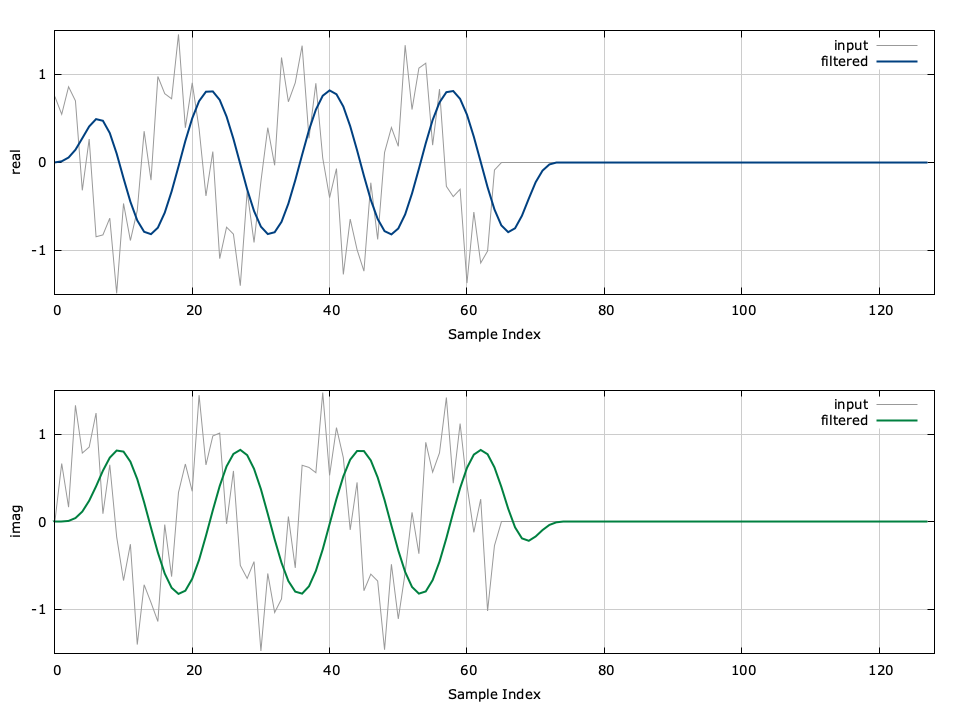Finite Impulse Response Filter (firfilt)
API Keywords: finite impulse response FIR filter firfilt firfilt_cccf firfilt_crcf firfilt_rrrf
Finite impulse response (FIR) filters are implemented in liquid with the firfilt family of objects. FIR filters (also known as non-recursive filters ) operate on discrete-time samples, computing the output \(y\) as the convolution of the input \(\vec{x}\) with the filter coefficients \(\vec{h}\) as
$$ y(n) = \sum_{k=0}^{N-1}{ h(k) x(N-k-1) } $$where \(\vec{h} = [h(0),h(1),\ldots,h(N-1)]\) is the filter impulse response. Notice that the output sample in the above equation is simply the vector dot product (see dotprod ) of the filter coefficients \(\vec{h}\) with the time-reversed sequence\(\vec{x}\) .
An example of the firfilt can be seen in[ref:fig-filter-firfilt_crcf] in which a low-pass filter is applied to a signal to remove a high-frequency component. An example of the firfilt interface is listed below.
#include <liquid/liquid.h>
int main() {
// options
unsigned int h_len=21; // filter order
float h[h_len]; // filter coefficients
// ... initialize filter coefficients ...
// create filter object
firfilt_crcf q = firfilt_crcf_create(h,h_len);
float complex x; // input sample
float complex y; // output sample
// execute filter (repeat as necessary)
{
firfilt_crcf_push(q, x); // push input sample
firfilt_crcf_execute(q,&y); // compute output
}
// destroy filter object
firfilt_crcf_destroy(q);
}
Listed below is the full interface to the firfilt family of objects. While each method is listed for firfilt_crcf , the same functionality applies to firfilt_rrrf and firfilt_cccf .
- firfilt_crcf_create(*h,N) creates a firfilt object with \(N\) filter coefficients\(\vec{h}\) .
- firfilt_crcf_recreate(q,*h,N) re-creates a firfilt object \(q\) with \(N\) filter coefficients\(\vec{h}\) ; if the length of the filter doesn't change, the internal state is preserved.
- firfilt_crcf_destroy(q) destroys a firfilt object, freeing all internally-allocated memory.
- firfilt_crcf_print(q) prints the parameters of a firfilt object to the standard output.
- firfilt_crcf_clear(q) clears the internal buffer of a firfilt object.
- firfilt_crcf_push(q,x) pushes an input sample \(x\) into the internal buffer of the filter object.
- firfilt_crcf_execute(q,*y) generates the output sample \(y\) by computing the vector dot product (see dotprod ) between the internal filter coefficients and the internal buffer.
- firfilt_crcf_get_length(q) returns the length of the filter.
- firfilt_crcf_freqresponse(q,fc,*H) returns the response of the filter at the frequency \(f_c\) , stored in the pointer \(H\) .
- firfilt_crcf_groupdelay(q,fc) returns the group delay of the filter at the frequency \(f_c\) .
